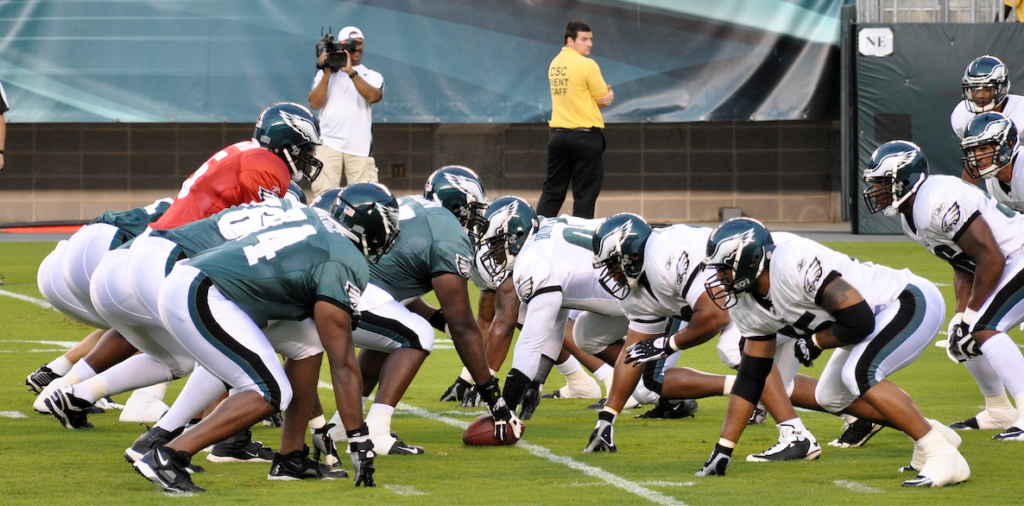Following in the tradition of Connor Barwin and Malcolm Jenkins, former All-Pro wide receiver and current Eagles broadcaster Mike Quick will write weekly for The Citizen this season, analyzing what the Birds will have to do each week on the field to emerge victorious. We’ve paired Quick with Professor Richardson Dilworth, Director of Drexel University’s Center for Public Policy, who will analyze how Philly stacks up off-the-field against the city we play each week. Dilworth, who knows nothing about football, is arguably Quick’s most unlikely teammate ever.
Mike Quick’s On-Field Scouting Report: First, a note about last week’s bummer of an overtime loss at Dallas. The Eagles are not a healthy team, but they fought to the very end, which I admire a lot. And they’re going to need the same sort of intensity this week, because the Los Angeles Rams are a very good team. They average 32 points a game. That’s a problem for the Eagles.
Last week, the Rams lost to Chicago, and the Eagles will have to do on defense what the Bears did: Pressure quarterback Jared Goff and clog up those run lanes. Then again, after losing to Chicago, the Rams are likely to be extra motivated.
On offense, Carson Wentz is hurt and it looks like Nick Foles will start at quarterback for the Eagles. A lot has been made of the offense’s 3rd down inefficiency, but the real problem is the lack of production on 1st and 2nd downs, which sets up difficult 3rd and long situations. The Eagles’ run game on 1st and 2nd has to give Foles manageable 3rd down opportunities.
Finally, there is still a ray of light. The Eagles have to win out the rest of the season for a chance to earn a wild card playoff spot. A lot of things have to happen in that case, but there’s always a chance. And where there’s a chance, there’s hope.
This is a somewhat weak win I’d say. In many instances our margin of victory is pretty small. For instance, with respect to bikes, is it really impressive that 1.1 percent more people in Philadelphia bike to work? Especially given that our city is less than one third the geographic size of L.A. (130 v 470 sq miles)? Much harder to bike to work in a less compact city
And as for parks, that is also a pretty slim win, and it doesn’t take into account other factors. Parks are for recreation but they are also part of a city’s “green infrastructure” that does things like mitigates the “heat island” effect of our urban built environments and provides for stormwater capture. And in this respect, L.A. deserves a lot of credit for its massive L.A. River Habitat Restoration Plan, for which it has gotten large federal investments but also is investing a lot from the city itself. Philadelphia’s Green City Clean Water program is also ambitious and more citywide—but all I’m saying is that we are pretty equally matched here, if we think of parks as part of city environmental policy.
And as for voter turnout? L.A. had a popular incumbent (Garcetti) in its last election (2017), and in Philadelphia there was no incumbent. So the lower turnout in L.A. was most likely a product of it being a pretty uninteresting election where everyone knew Garcetti would win overwhelmingly, which he did.
If I had to guess, I would say that turnout will also be lower in Philadelphia for the 2019 mayoral election. I just don’t think having Butkovitz in the race is going to make it any more exciting.
As for mayors, I think we kind of win here. Both Garcetti and Kenney have been effective mayors who in their first terms achieved significant policy goals, though there was nothing from the Garcetti administration that captured national attention like the soda tax. And Garcetti is frustrating because he is such an annoyingly charismatic politician who obviously wants to be president, and possibly for that reason has stuck to safer issues—though certainly important ones. I much prefer the cantankerous, Elf-suit-wearing, sanctuary-city-happy dancing Kenney, who appears to have zero interest in higher office.
Two more points: First, L.A. Open Data s pretty cool. I don’t think we have anything quite this interesting. Second, Philadelphia wins on the housing front. We have a much higher rate of homeownership (52 v 37 percent for 2013-2017) and our average housing price is MUCH lower —$151,500 v $549,800 (these are median figures for 2013-2017).
So, I sort of think it’s a tie.

